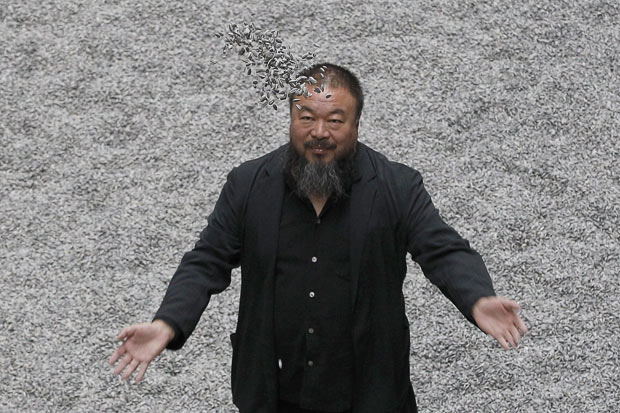
Chinese artist and activist Ai Weiwei standing on/in one of his exhibitions called "Sunflower Seeds." It's literally millions of sunflower seeds spread out across the floor of a warehouse. He is featured in the new documentary "Ai Weiwei: Never Sorry." Photo credit: Reuters
Recently I’ve focused on democracy issues on a pretty grand scale: the nation of Egypt’s first open presidential elections, Greece’s struggle to form a government and how it might impact the global economy.
Yet one of the remarkable things about democracy is that you don’t need large numbers to make a difference. Sometimes all it takes is one, one person or one group with a cause and determination to fight for it. The one sometimes turns into many, who have the power to bring change, even bringing democracy itself to places where it did not exist before. Just ask the people of the Arab Spring. But all it takes to start down this path is the power of one.
I was reminded of this recently when I attended a film festival in Colorado. I saw several documentaries that profiled courageous individuals–operating in different parts of the world and in societies with limited openness–who prove just how far-reaching and inspiring the power of one can be. I would like to briefly share two of these stories as told by the following films.
Ai Weiwei is a Chinese artist and designer. Exhibitions of his work have been shown around the world. He became such a rising star in China’s art community that the government hired him to help design its iconic “Bird’s Nest” stadium for the 2008 Olympics in Beijing.
Yet Ai Weiwei clashed with the Chinese government when he tried to gather information about the thousands of children who died in the spring ’08 earthquake in Sichuan province. Many perished in government-built schools, and Ai Weiwei thought the country’s leaders should own up to their responsibility and give due respect to the children who died (the government tried to downplay any wrongdoing, even as many pointed to schools’ shoddy construction and insufficient safety standards). After police physically assaulted him, an infuriated Ai Weiwei refused to attend the Olympics in the stadium he helped design- a very public rebuke of the ruling regime.
Ai Weiwei recounted his experiences on a website that acquired a significant following. When the Chinese government shut it down, he start getting his message out on Twitter. He now has webcams set up around his house and studio so his followers–and, with a wink, Chinese authorities–can see what he’s up to. Thousands have joined his cause, and put increased pressure on officials to be accountable for the collapse of school buildings. It all started because of one person’s dedication and resolve.
Baseball in the Time of Cholera
As if Haiti’s devastating earthquake in 2010 wasn’t horrible enough, in its wake a cholera epidemic emerged. The source? Incredibly, it is widely believed UN peacekeeping forces from Nepal brought the disease from Asia, and it spread due to horribly inadequate sanitation standards. The UN vehemently denies it is at fault, in spite of overwhelming evidence to the contrary.
Several lawyers, based in Haiti and abroad, are filing suit against the UN on behalf of cholera victims. The lawyers and the Haitian people demand that the organization assume responsibility for the outbreak. Facing overwhelming odds, lawyers and their supporters are committed to fighting the injustice brought against them. They have succeeded in bringing international attention to, and outrage over, this issue. An Economist article about it is titled “UN in Haiti: First, do no harm.” Thus, a few dedicated individuals (and one Haitian lawyer, as profiled in the film, in particular) can make a difference.
[By the way, the film’s title refers to Haiti’s one and only Little League Baseball team–shown in the film–whose players have turned to baseball as an escape from the terrible conditions around them.]
——-
I think these cases show that democratic ideals can flourish even in places that don’t have much democracy. The will of one person, and of groups of people, really does lead to change. It’s how we create a better world.